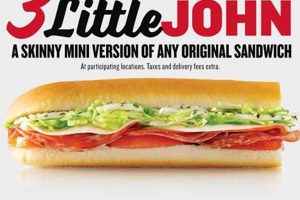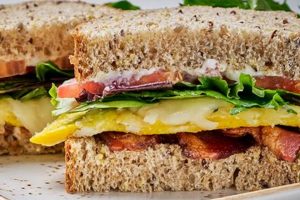Establishments offering Mexican cuisine that also cater to plant-based dietary preferences are becoming increasingly prevalent. These dining locations present traditional dishes modified to exclude animal products such as meat, dairy, and eggs, utilizing ingredients like beans, vegetables, and plant-based protein substitutes. A typical example might include tacos filled with seasoned lentils instead of ground beef, or enchiladas smothered in vegan cheese alternative.
The significance of these establishments lies in their ability to accommodate a wider range of dietary needs and ethical considerations. Historically, Mexican cuisine has heavily relied on animal products; however, the growing demand for plant-based options has driven culinary innovation. Benefits include increased accessibility for individuals adhering to vegan diets, reduced environmental impact associated with animal agriculture, and broadened appeal to health-conscious consumers.
The subsequent sections will delve deeper into the diverse culinary landscape of Mexican-inspired plant-based fare, examining specific menu items, ingredient innovations, and the evolving consumer trends driving the expansion of these dining venues.
These recommendations aim to provide insight into making informed and satisfying choices when selecting plant-based options at Mexican-inspired dining locations.
Tip 1: Inquire About Ingredients. Confirm the absence of animal products in sauces, marinades, and cooking oils. Many sauces, for example, traditionally incorporate lard or chicken broth.
Tip 2: Scrutinize Cheese Substitutes. Plant-based cheeses vary significantly in quality and flavor. Request information about the specific brand and ingredients used to ensure satisfaction.
Tip 3: Explore Bean-Based Dishes. Black beans, pinto beans, and refried beans (ensure they are prepared without lard) are excellent sources of protein and fiber and form the base of many plant-based meals.
Tip 4: Opt for Vegetable-Focused Options. Fajitas with mixed vegetables, grilled vegetable tacos, and roasted corn are flavorful and nutritious choices.
Tip 5: Customize Orders. Request dishes without sour cream, cheese, or meat, and substitute with guacamole, salsa, or extra vegetables.
Tip 6: Be Mindful of Hidden Ingredients. Rice and tortillas may contain animal products. Confirm their composition before ordering.
Tip 7: Seek Out Tempeh or Seitan Alternatives. Some establishments offer tempeh or seitan as meat substitutes in tacos, burritos, or other dishes.
By considering these points, patrons can ensure a positive dining experience while adhering to plant-based dietary preferences.
The following section will explore the future trends and innovations within this evolving culinary niche.
1. Menu Diversification
Menu diversification is a critical element for Mexican restaurants aiming to effectively cater to the growing demand for plant-based options. It involves expanding beyond rudimentary substitutions and developing a comprehensive selection of dishes that appeal to both vegan and non-vegan patrons. The success of a plant-based menu within this culinary context hinges on innovation, authenticity, and a clear understanding of vegan dietary requirements.
- Creative Ingredient Integration
This facet involves incorporating a wide array of plant-based ingredients beyond the standard beans and vegetables. Examples include utilizing jackfruit as a substitute for pulled pork, mushrooms as a replacement for carne asada, or crafting cashew-based sauces to mimic the richness of traditional dairy-based creams. Creative ingredient integration allows for the replication of familiar flavors and textures, enhancing the appeal of vegan options.
- Adaptation of Traditional Dishes
Many classic Mexican dishes can be adapted to vegan preferences without compromising authenticity. This can involve using plant-based protein alternatives in tacos, enchiladas, or burritos. Refried beans should be prepared without lard, and rice should be cooked without chicken broth. The key is to maintain the core flavors and techniques while removing animal products.
- Dedicated Vegan Menu Section
A dedicated vegan section on the menu improves visibility and simplifies the selection process for vegan diners. This section should clearly list all ingredients and preparation methods, ensuring transparency and building trust. It should also highlight dishes that are naturally vegan or can be easily modified to meet vegan requirements.
- Offerings Beyond Main Courses
Menu diversification extends beyond main courses to include appetizers, sides, and desserts. Offering vegan versions of classic Mexican appetizers like guacamole and salsas, ensuring rice and beans are prepared without animal products, and providing plant-based dessert options demonstrates a commitment to catering to all aspects of the vegan dining experience.
The effective implementation of menu diversification strategies is essential for Mexican restaurants seeking to attract and retain vegan customers. By focusing on creative ingredient integration, adapting traditional dishes, offering a dedicated vegan menu section, and providing a range of vegan options beyond main courses, these establishments can successfully cater to the growing demand for plant-based Mexican cuisine and broaden their customer base.
2. Ingredient Sourcing
Ingredient sourcing plays a pivotal role in the success and integrity of any establishment offering Mexican cuisine with plant-based options. It directly impacts the quality, authenticity, and ethical considerations associated with vegan dishes. The selection and procurement of ingredients are paramount to meeting the expectations of discerning vegan patrons and maintaining culinary standards.
- Ethical and Sustainable Practices
Ingredient sourcing dictates adherence to ethical and sustainable farming practices. Prioritizing locally sourced produce, when feasible, reduces environmental impact related to transportation and supports regional economies. Furthermore, seeking out suppliers committed to fair labor practices ensures the well-being of agricultural workers. These choices resonate with vegan values that extend beyond dietary considerations to encompass broader ethical concerns.
- Freshness and Quality
The ultimate flavor and nutritional value of vegan Mexican dishes hinges on the freshness and quality of the ingredients. Utilizing seasonal produce at its peak ripeness enhances taste profiles and minimizes waste. Selecting high-quality grains, beans, and spices ensures authenticity and contributes to the overall dining experience. The difference between a mediocre and exceptional dish often lies in the caliber of the raw materials.
- Transparency and Traceability
Vegan diners increasingly demand transparency regarding the origin and production methods of ingredients. Establishments should be prepared to provide information about their suppliers, farming practices, and any certifications held. Traceability allows for verification of claims related to sustainability, ethical sourcing, and organic status, building trust and fostering customer loyalty.
- Sourcing Vegan-Specific Ingredients
The increasing number of vegan-specific ingredients is something a restaurant must consider. Tofu, Tempeh, Seitan, and plant-based cheese must be considered carefully to maintain high quality. In many instances, these sources are more expensive than traditional, non-vegan sources.
The multifaceted nature of ingredient sourcing highlights its importance in shaping the plant-based Mexican dining experience. By prioritizing ethical practices, freshness, transparency, and careful selection, establishments can effectively cater to the needs of vegan patrons while upholding culinary integrity and contributing to a more sustainable food system. Effectively sourcing ingredients enables a better dining experience.
3. Flavor Authenticity
Flavor authenticity represents a central challenge and opportunity for dining establishments offering Mexican cuisine with plant-based options. Maintaining traditional taste profiles while adhering to vegan dietary constraints requires careful consideration of ingredient substitutions, cooking techniques, and cultural nuances. The perception of authenticity significantly influences consumer satisfaction and the overall success of these venues.
- Spice Blends and Traditional Sauces
Many Mexican dishes rely on complex spice blends and signature sauces. Replicating these flavors without animal products necessitates creative alternatives. For example, smoky chipotle peppers can impart depth without the use of meat-based stocks, and nut-based creams can replace dairy in sauces like queso. Attention to detail in spice ratios and sauce preparation is crucial for achieving authentic flavor profiles.
- Use of Traditional Vegetables and Herbs
Certain vegetables and herbs are integral to Mexican cuisine. Epazote, hoja santa, and various types of chiles contribute distinct flavors that are difficult to replicate. Incorporating these ingredients in vegan dishes helps maintain a sense of authenticity. Restaurants should prioritize sourcing high-quality, fresh produce to maximize flavor impact.
- Embracing Regional Variations
Mexican cuisine varies significantly by region. Authentic flavors often reflect specific regional ingredients and cooking methods. Vegan establishments can enhance their credibility by highlighting regional specialties and showcasing the diversity of Mexican culinary traditions. This approach allows for a more nuanced and flavorful dining experience.
- The Role of Umami
Umami, often associated with meat and cheese, is essential for creating satisfying and savory dishes. In vegan Mexican cuisine, umami can be achieved through ingredients like roasted vegetables, mushrooms, and fermented products. Strategic use of these ingredients can replicate the richness and depth of flavor typically found in non-vegan dishes.
Preserving flavor authenticity in plant-based Mexican cuisine requires a delicate balance of culinary creativity and respect for tradition. By carefully considering spice blends, utilizing traditional ingredients, embracing regional variations, and leveraging umami-rich elements, establishments can deliver a dining experience that is both vegan and authentically Mexican, thereby appealing to a broader range of customers.
4. Cross-Contamination Prevention
Cross-contamination prevention is a critical component of successful establishments offering Mexican cuisine with plant-based options. The failure to adequately prevent cross-contamination can have severe consequences for patrons adhering to vegan diets, potentially causing both ethical and health-related concerns. For a vegan diner, even trace amounts of animal products constitute a violation of their dietary principles. Therefore, restaurants need to implement strict protocols to avoid the inadvertent introduction of animal-derived ingredients into vegan dishes.
Effective strategies for cross-contamination prevention include dedicating separate cooking surfaces, utensils, and storage areas for vegan ingredients. For example, designating a specific fryer exclusively for plant-based items prevents contamination from animal fats. Similarly, using separate cutting boards and knives for vegetables and meats minimizes the risk of transfer. Clear labeling and color-coded systems further aid in identifying and segregating vegan ingredients. Furthermore, careful training for kitchen staff is essential. Employees must be educated on the importance of cross-contamination prevention and trained in proper handling procedures. A real-life example is a restaurant where refried beans are traditionally made with lard. To accommodate vegan customers, the restaurant prepares a separate batch of lard-free refried beans using dedicated equipment. The lack of effective cross-contamination prevention can deter vegan customers, damage the restaurant’s reputation, and, in some cases, lead to legal repercussions.
In summary, cross-contamination prevention is not merely a procedural detail but an ethical and operational imperative for businesses claiming to offer plant-based options. The commitment to stringent practices ensures the integrity of vegan dishes, safeguards the well-being of vegan customers, and enhances the restaurant’s credibility. The challenge lies in consistently implementing and maintaining these protocols across all aspects of food preparation, requiring ongoing vigilance and a proactive approach. Ultimately, a proactive approach leads to customers’ satisfaction.
5. Staff Training
Effective staff training is a cornerstone of any Mexican restaurant that seeks to successfully offer vegan options. Insufficiently trained staff can lead to inaccurate information being conveyed to customers, improper food handling practices, and ultimately, a negative dining experience for vegan patrons. Staff must understand what constitutes a vegan diet, be able to identify ingredients that are permissible and prohibited, and be aware of the potential for cross-contamination. A lack of training can result in misunderstandings about menu items, leading to a dish being misrepresented as vegan when it contains animal products, such as lard in refried beans or chicken broth in rice. This is a cause-and-effect relationship: the cause is insufficient training and the effect is the detriment of vegan customers and a bad reputation.
Practical applications of staff training include educating employees on how to modify traditional dishes to accommodate vegan preferences. For example, staff should know that sour cream can be substituted with cashew cream, or that cheese can be omitted entirely or replaced with a plant-based alternative. Furthermore, staff must be trained to prevent cross-contamination during food preparation. This includes using separate utensils and cookware for vegan dishes, and ensuring that vegan ingredients are stored apart from animal products. The ability of staff to confidently answer customer inquiries regarding ingredients, preparation methods, and potential allergens is crucial for establishing trust and demonstrating a commitment to serving vegan diners.
In summary, the success of a Mexican restaurant with vegan options hinges significantly on the quality of staff training. Comprehensive training equips employees with the knowledge and skills necessary to accurately represent vegan dishes, prevent cross-contamination, and provide a positive dining experience for vegan customers. While the financial investment in training may seem like a challenge, the long-term benefits of increased customer satisfaction, positive word-of-mouth, and a strong reputation as a vegan-friendly establishment far outweigh the initial costs. Staff training provides the foundation for success when a business aims to cater to plant based diets.
Frequently Asked Questions
The following section addresses common inquiries regarding dining at Mexican restaurants offering plant-based alternatives. These questions aim to provide clarity and transparency concerning menu options, preparation methods, and other relevant considerations.
Question 1: Are all vegetarian items inherently vegan?
No. Vegetarian dishes may contain dairy products, eggs, or honey, which are not permissible in a vegan diet. It is imperative to confirm the absence of these ingredients when selecting menu items.
Question 2: How can cross-contamination be prevented in the kitchen?
Reputable establishments employ separate cooking surfaces, utensils, and storage areas for vegan ingredients to minimize the risk of contact with animal products. Inquiring about these procedures is advisable.
Question 3: What are common non-vegan ingredients found in Mexican cuisine?
Lard, chicken broth, dairy cheese, sour cream, and honey are frequently used in traditional Mexican recipes. Vigilance is necessary to identify and avoid these components.
Question 4: Are plant-based cheese substitutes readily available?
The availability and quality of plant-based cheese substitutes vary. It is recommended to inquire about the brand and ingredients used to ensure satisfaction and adherence to dietary needs.
Question 5: Can traditional Mexican dishes be effectively adapted to vegan preferences?
Many classic recipes can be modified by replacing animal products with plant-based alternatives. Success depends on culinary expertise and a commitment to maintaining flavor integrity.
Question 6: What steps can one take to ensure a satisfactory vegan dining experience?
Researching menu options in advance, communicating dietary restrictions clearly to staff, and inquiring about ingredient sourcing contribute to a positive outcome. It is important to be direct and not assume an option is plant-based.
The pursuit of accurate information and proactive communication is paramount for individuals seeking to dine at establishments offering Mexican cuisine with plant-based options.
The subsequent section will explore emerging trends and advancements in plant-based Mexican culinary innovations.
Mexican Restaurant with Vegan Options
The preceding discourse has explored the multifaceted nature of the mexican restaurant with vegan options landscape. Key aspects, including menu diversification, ingredient sourcing, flavor authenticity, cross-contamination prevention, and staff training, have been examined to provide a comprehensive understanding of the challenges and opportunities within this evolving culinary niche. Effective implementation of these principles is crucial for establishments seeking to cater to the growing demand for plant-based Mexican cuisine.
The future trajectory of mexican restaurant with vegan options hinges on continued innovation, ethical sourcing practices, and a commitment to delivering authentic flavor experiences. As consumer awareness and demand for plant-based options continue to rise, establishments that prioritize these factors will be well-positioned for sustained success and contribute to a more inclusive and sustainable culinary ecosystem. The continued evolution of this sector signals a promising shift towards broader accessibility and acceptance of plant-based diets within the wider culinary world.







